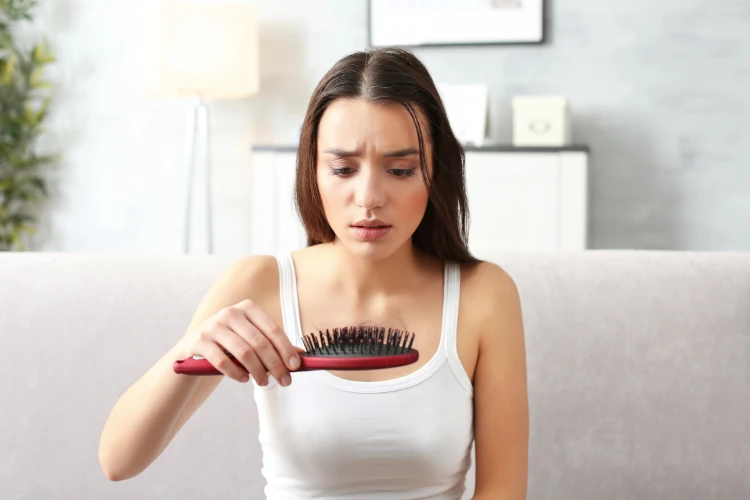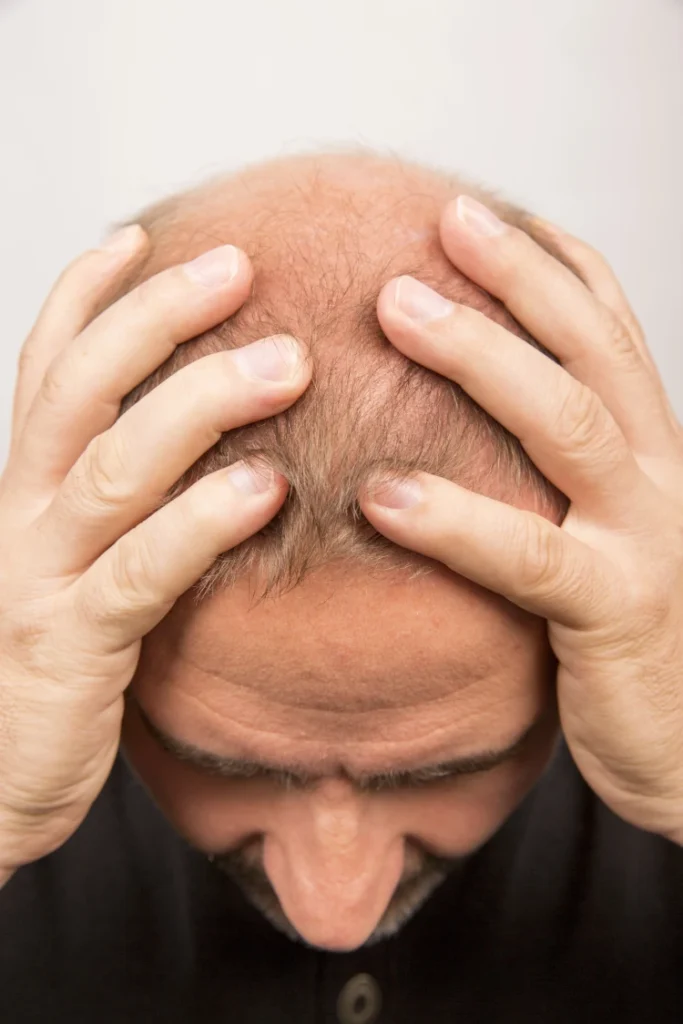
Understanding Stress-Related Hair Loss
Stress finds its way into nearly every aspect of daily life, interfering with sleep, mood, and even the natural cycle of hair growth. It’s not unusual for people to notice more shedding or thinning during particularly difficult seasons of life, which can add another layer of anxiety on top of what they’re already carrying.
Figuring out how stress affects your hair isn’t only about looks. It’s also about tuning into your body’s signals and finding ways to support your health, inside and out.
How Does Stress Cause Hair Loss?
Stress triggers a complex biological response involving hormones like cortisol, inflammatory cytokines, and nervous system activity, which may disrupt the hair growth cycle — particularly by inducing a shift from the anagen (growth) phase to the telogen (rest) phase earlier than usual.
This disruption is a hallmark of telogen effluvium, a condition where hair follicles temporarily go dormant. A few months after experiencing stress, this dormancy can result in a noticeable wave of shedding that takes many by surprise. Though the hair often regrows, the experience can still feel jarring and unsettling.
Besides physical changes, stress also affects how people see themselves. Hair loss can lead to higher anxiety and make people feel self-conscious, especially if it affects their hairline or creates patchy areas that are hard to hide.
In some cases, this distress becomes more than a passing worry. It can develop into hairline dysphoria, a deeply emotional reaction where concern over one’s hairline feels constant and consuming.
Types of Hair Loss Caused From Stress
Stress doesn’t cause just one kind of hair loss. In fact, it can set off a variety of conditions and mechanisms that affect hair, each of which stems from how our bodies and minds respond to prolonged pressure. Several conditions are linked to mental and emotional strain, including:
- Telogen effluvium: The most common stress-induced form of hair loss, it causes large numbers of hairs to enter the resting phase and fall out, often several weeks or months after a stressful event.
- Trichotillomania: This is a behavioral condition in which individuals compulsively pull out their own hair, usually as a response to anxiety or emotional distress.
- Alopecia areata: While the exact cause of alopecia areata is unknown, it is an autoimmune condition, and psychological stress is thought to contribute to flare-ups in some individuals.
- Scalp psoriasis: As an autoimmune disorder, psoriasis isn’t directly caused by stress. But stress often triggers flare-ups, which can worsen inflammation and flaking on the scalp. Psoriasis flare-ups may lead to temporary hair loss by irritating the scalp, weakening hair shafts, and disrupting the hair growth cycle.
Because each form of stress-related hair loss stems from different causes and presents with unique symptoms, learning what sets them apart can help you take more informed and confident steps toward recovery.
Signs You May Be Experiencing Hair Loss From Stress

Hair loss from stress can sometimes catch you completely by surprise. If you suddenly notice your hair thinning all over rather than in isolated spots, stress might be the culprit. Hair shedding from stress-related causes, such as telogen effluvium, often appears two to three months after a triggering event.
Another clue is finding more strands than usual on your pillow, clogging the shower drain, or tangled in your brush. When shedding feels excessive and lasts for a while, it’s worth paying attention.
In some cases, hair falls out in small, round patches. That kind of pattern could point to an underlying autoimmune issue made worse by psychological strain. Spotting these changes early gives you a better shot at slowing or stopping the progression of hair loss — and of early intervention to the underlying cause.
The emotional weight of hair loss shouldn’t be underestimated either. If you catch yourself avoiding mirrors or skipping social plans because of how your hair looks, it may be time to check in with how stress is showing up in your life and get professional support if necessary.
How To Reverse Hair Loss Caused by Stress?
Lowering your stress levels is often the most effective way to slow — or even stop — hair loss linked to anxiety and burnout. Practices like meditation, deep breathing, or working with a therapist can make a measurable difference by calming the nervous system and helping your body recover.
Sleep is another major piece of the puzzle. When your rest is off, your hormones tend to follow. A regular, relaxing bedtime routine can support both your mental state and the health of your hair. Add some regular movement into the mix, like walking or stretching, and you’re giving your system another tool to rebalance itself.
In most cases of stress-related hair shedding, full regrowth is expected once the underlying cause is addressed. Hair transplants are generally reserved for cases of permanent hair loss, such as androgenetic alopecia.
Hair restoration methods, especially hair transplants, have become more advanced, more natural-looking, and more accessible than ever before. These procedures can be a strong next step for people who’ve tried noninvasive methods without much progress.
If you’re thinking about going this route, it helps to understand the costs involved and how to plan ahead financially. It also helps to see real-world examples. Before-and-after photos can give you a clearer idea of what’s possible — and what kind of outcome you might expect with a hair transplant.


